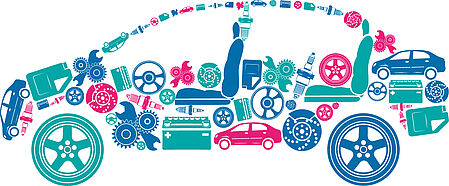With the rapid popularization of new energy vehicles and the continuous advancement of intelligent technology, the automobile industry is undergoing a profound change. The production cycle and supply chain model of traditional fuel vehicles are being strongly impacted by electrification, autonomous driving, and intelligent transformation. According to the analysis of industry experts, 2025 will be a key node, and the demand for semiconductors in the automotive industry will usher in explosive growth, and behind this, the profound adjustment of the automotive supply chain model and the acceleration of technology iteration will become the driving force.
A breakthrough in the penetration rate of new energy vehicles
New energy vehicles, especially electric vehicles (EVs), are changing the face of the global automotive market. Zhang Junchao, director of automotive chip group operations at the National New Energy Vehicle Technology Innovation Center, pointed out that it is expected that by 2025, the market penetration rate of new energy vehicles may reach 50% or even higher. This change not only represents progress in environmental protection and the energy transition, but also means that the demand for automotive semiconductors will increase exponentially.
Compared with traditional fuel vehicles, the demand for semiconductors for new energy vehicles has increased significantly. New energy vehicles are more dependent on chips in the fields of battery management, electric drive, and intelligent driving assistance systems (ADAS). Wang Xianbin, vice president of Gasgoo Automotive Research Institute, pointed out that a fuel vehicle usually needs 600-800 chips, while electric vehicles need more than 1,000 chips, this gap highlights the huge role of electrification in promoting the demand for semiconductors.
The accelerated popularization of intelligent and autonomous driving technologies
In addition to electrification, the spread of assisted driving and autonomous driving technologies are another major force driving changes in the automotive industry. From high-end models to low-end models, more and more intelligent functions are becoming standard. With the improvement of intelligence, the demand for semiconductors in automobiles is not only reflected in the power system and battery management, but also more semiconductors in the fields of intelligent sensors and autonomous driving computing platforms will also be widely used.
He Hui, chief analyst of the semiconductor industry at Omdia, mentioned that global automotive OEMs (original equipment manufacturers) are accelerating the transformation of electrification, but the electrification architecture of vehicles has not yet been fully determined, and there is still a lot of room for change in the future. This means that the technological iteration of the automobile industry will be faster and faster, driving the upgrading of the entire industrial chain. This rapid iteration is not only reflected in the technology products, but also in the transformation of the automotive supply chain model itself.

Figure: Shortened iteration cycles, new challenges in the automotive supply chain (Source: Ingenics)
A profound change in the supply chain model
With the continuous advancement of the electrification process of the automotive market, the supply chain model in the automotive industry chain will also usher in subversive changes. In the past, the automotive industry had a long production cycle, and supply chain management focused on stability and efficiency in mass production. However, in the context of the rapid development of new energy vehicles and intelligent technologies, the iteration cycle will be significantly shortened, and the flexibility and response speed of the supply chain have become particularly important.
First of all, traditional auto parts production and suppliers may face greater challenges. As the proportion of chips in automobiles continues to rise, semiconductor manufacturers in the supply chain will become the core key. On the one hand, traditional chip manufacturers need to accelerate innovation and capacity expansion to meet the growing market demand. On the other hand, the cooperation between automakers and chip suppliers will become closer, and there may even be a model of shared R&D and production to cope with the rapidly changing market environment.
Second, the trend of supply chain localization and digitalization will further accelerate. In the past, the automotive industry chain relied on a global supply chain, but the crisis of the global chip shortage has made the entire industry realize the risks of over-reliance on a single regional supply chain. In the future, more automakers are likely to push for supply chain localization to ensure flexibility and stability in production and supply.
Changing markets and supply chains
Disruption in the automotive supply chain will not be limited to the relationship between traditional suppliers and manufacturers, but will also extend to the sharing and collaboration of data and technology. For example, automotive companies and semiconductor manufacturers may jointly invest in new production processes to improve the production efficiency and quality of chips while reducing production costs. In addition, with the introduction of AI, 5G and other technologies, the future automotive supply chain will rely more on digital tools for management, from demand forecasting to production scheduling to supply chain optimization, digital means will play a vital role in this.
Conclusion
Overall, in 2025 and beyond, the demand for semiconductors in the automotive industry will continue to rise, and the speed of technology iteration will become faster and faster. This change is not only reflected in the update of product technology, but also includes the profound reshaping of the automotive supply chain model. From the traditional production model to more flexible and efficient supply chain management, from traditional fuel vehicles to electrified and intelligent new vehicles, every change in the automotive industry will bring new opportunities for the semiconductor industry. In the next few years, the electrification and intelligence of the automotive industry will drive the semiconductor market to usher in more rapid and sustainable growth.






